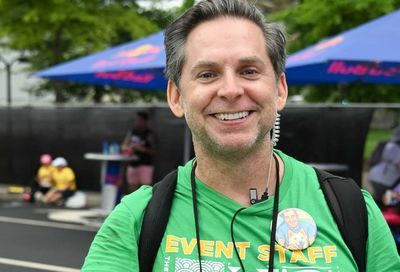Meet the New Bias, Same as the Old Bias
Lawyers challenge California's Prop 8 with comparisons to Anita Bryant's ''Save the Children'' campaign of the 1970s
SAN FRANCISCO – Attorneys challenging the California ballot measure that banned same-sex marriage painted the ”Yes on 8” campaign today as a modern day copycat of Anita Bryant’s late 1970s campaign to ”Save the Children.” Through testimony by gay history scholar George Chauncey of Yale University, the plaintiffs’ legal team discussed the creation of unsubstantiated stereotyping of gay men as child molesters by police and news media around the country between the 1930s and 1950s.
And it was these stereotypes that former beauty pageant contestant and orange juice pitchwoman Anita Bryant exploited to turn public sentiment against anti-discrimination laws gays had been successful in passing in the 1970s.
”The initial polling data showed there was actually a margin of support for anti-bias ordinances,” said Chauncey. So Bryant and her campaign, he said, ”decided to focus on the consequences of allowing such laws — the effects on children.”
”They made two arguments,” he said, during his appearance as an expert in gay history on the witness stand in the Proposition 8 trial Tuesday. ”That simple tolerance of gays would mean they’ll become role models so kids would become gay,” and that gays are child molesters.
In testimony today and Monday, witnesses for the plaintiffs discussed a number of ”Yes on 8” television ads and fliers which underscored the campaign slogan ”Protect your children.”
The campaign against gay marriage, said Chauncey, is just ”the latest stage in a cycle of anti-gay rights campaigns…with similar intent and using some of the same imagery.”
Therese Stewart, Chief Deputy City Attorney for San Francisco, introduced five television ads used by the ”Yes on 8” campaign, all of which used images and language involving children who needed to be ”protected” by their parents from learning about gay people being able to marry.
The ads, testified Chauncey, ”are more polite than the ads Anita Bryant used 30 years ago.” But the message they convey, he said, ”is that simple exposure to gay people in a relationship will lead a generation of young kids to become gay.”
Chauncey’s testimony, coupled with that on Monday of the four openly gay plaintiffs who said their experience of their sexual orientation was that it was something they were born with, is building a case for Proposition 8 to be scrutinized with the court’s highest standard: strict scrutiny. At that level, proponents of Proposition 8 must be able to demonstrate a compelling need for the state’s marriage laws to treat gays as less than equal to all other citizens. Otherwise, proponents need demonstrate merely a simple rational reason for the same-sex marriage ban.
On the witness stand both days was Harvard history professor Nancy Cott, who was called by plaintiffs’ attorneys to give testimony about the history of marriage in the United States. Cott refuted defense attorney Charles Cooper’s opening statement in which he claimed that marriage has, over many cultures and many centuries, been defined as ”one man and one woman” and been constructed for the purpose of procreation and providing for the well-being of children.
”By no means is that the central or defining purpose,” said Cott during her examination on Tuesday morning. ”Marriage has many purposes,” she said, likening Cooper’s contention to that of the story of seven blind men all touching an elephant in a different spot and, thus, each claiming the feel of an elephant is starkly different than the others.
The larger purpose of marriage through the ages, said Cott, has been the formation and stability of the household.
”There has never been a requirement that a [married] couple produce children in order to have a valid marriage,” said Cott, noting that President George Washington was sterile, but married twice.
Cott offered numerous comparisons between restrictions against same-sex couples marrying and restrictions through history put on other groups, mostly racial minorities. She noted, too, that marriage has changed dramatically over the years, from a relationship which entitled a man to treat his wife as property and servant to one in which both partners are essentially equal with self-defined roles.
The take-home message from Cott was that the efforts by gay and lesbian couples to obtain equal access to marriage has actually done much to improve the status of marriage in the United States, not harm it. She noted, for instance, that the divorce rate in her home state of Massachusetts, the first state in the nation to issue marriage licenses to same-sex couples, is the lowest of any state in the nation.
”By excluding same-sex couples from marriage,” said Cott, ”society is denying itself another resource for stability.”
This was not the testimony sought by one of the defense team’s attorneys, David Thompson. Thompson’s line of questions sought to discredit her by suggesting her views were far from mainstream. He questioned why she had signed on as a supporter of a statement that appeared to endorse polygamy. Cott said she believed, in signing the statement, she was supporting the notion that ”all healthy families should be supported” but that she did not support extending rights and benefits to ”polyamorous” families.
Often adopting a bombastic and dramatic style used by television actors portraying attorneys, Thompson pummeled Cott with a string of ”Did you know?” questions that challenged her comparison of marriage discrimination against racial minorities to that of same-sex couples by listing a number of states, one by one, and asking whether she knew that that state ”never” had a ban on interracial marriage.
He spent an inordinate amount of time reading quotes, from both Cott and from other persons who had written about marriage, and asking Cott whether she agreed with those statements.
After a while, Cott appeared to grow weary of the technique and returned some resistance. On one occasion, after he read a statement, he forgot to ask, ”Correct?” and Cott sat silently on the stand. For a long moment, he stood there, staring at his interrogation binder, ready to shoot the next question. Then, finally, he looked up at her, as if to prompt her to answer him.
”You didn’t ask me a question,” she said.
On another occasion, Thompson read a statement from one of Cott’s books and, before he could ask her whether she agreed, Cott shot back, ”I wrote that.”
Thompson sometimes provoked audible gasps and giggles in the courtroom on occasion.
During one exchange, he read from a document from the U.S. Centers for Disease Control and Prevention that reportedly stated that only one percent of babies born in the U.S. in 2004 were conceived using ”artificial reproductive technology.” He then asked Cott whether that means that ”99 percent of children are the product of a procreative act.”
He asked whether it was true that ”one of the distinctive things about Jesus Christ” was that he counseled his followers to pursue only a single partner in marriage.
”I know very little about Jesus Christ,” said Cott, interrupting. She had, in fact, testified during direct examination that Christianity had been largely responsible for the development of monogamy as a value.
Thompson asked Cott whether there has there ever been in the United States a state law ”preventing a man with a homosexual orientation from marrying a woman who has a homosexual orientation.” That question was likely aimed at knocking down plaintiffs’ argument that Proposition 8 discriminates based on both sexual orientation and sex.
Thompson had only 10 minutes today to engage in his cross-examination of Chauncey, who also gave similar testimony during the trial that successfully challenged the constitutionality of Colorado’s anti-gay initiative, Amendment 2, in Romer v. Evans. Cross-examination of Chauncey in Perry v. Schwarzenegger will resume Wednesday morning at 8:30 Pacific time. Meanwhile, the court still awaits a decision from the U.S. Supreme Court on Wednesday as to whether these proceedings may be made available to the public through YouTube and closed circuit broadcast in other federal courthouses.
© 2010 by Keen News Service. All rights reserved.
Support Metro Weekly’s Journalism
These are challenging times for news organizations. And yet it’s crucial we stay active and provide vital resources and information to both our local readers and the world. So won’t you please take a moment and consider supporting Metro Weekly with a membership? For as little as $5 a month, you can help ensure Metro Weekly magazine and MetroWeekly.com remain free, viable resources as we provide the best, most diverse, culturally-resonant LGBTQ coverage in both the D.C. region and around the world. Memberships come with exclusive perks and discounts, your own personal digital delivery of each week’s magazine (and an archive), access to our Member's Lounge when it launches this fall, and exclusive members-only items like Metro Weekly Membership Mugs and Tote Bags! Check out all our membership levels here and please join us today!
























